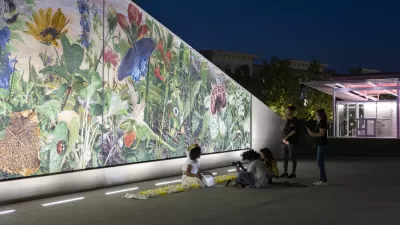One of the city’s biggest assets is its riverfront, but equity and inclusion need to be an important part of what development brings to residents and communities.

Carol Coletta of the Memphis River Parks Partnership writes that Memphis has not taken full advantage of the development and investment potential of the riverfront property along the Mississippi River. The organization, she says, is not funded specifically to pursue equity strategies, but the city's high levels of poverty and segregation means this aspect of its work cannot be ignored. "Instead, we must integrate equity into all that we do, and we must do it within existing financial constraints."
She outlines the model that guides the work of the partnership. Staff development involves providing a living wage and advancement opportunities, and contractor development supports minority- and women-owned businesses. The organization has also made community engagement a top priority, says Coletta. "We believe in the importance of inviting community members in, not just as consumers, but as shapers and stewards of the riverfront."
The riverfront needs to be accessible to all residents, and projects need to connect it to surrounding communities, adds Coletta. "In particular, we are leading efforts to define pedestrian and cycling corridors between the riverfront and surrounding neighborhoods, as well as bring attention to the long-overlooked MLK Park south of downtown, to use as an anchor for new investment in the adjacent neighborhood." Free programming is another way the organization is working to promote diversity among users of the riverfront.
"Questions of equity and inclusion are always present, both in the operation of the enterprise and in the riverfront we are attempting to create. Creating a riverfront that works for everyone, every day, is the only way to achieve our mission of harnessing the transformative power of the river for all Memphians," says Coletta.
FULL STORY: How Memphis, Tennessee is transforming the city through its riverfront

Maui's Vacation Rental Debate Turns Ugly
Verbal attacks, misinformation campaigns and fistfights plague a high-stakes debate to convert thousands of vacation rentals into long-term housing.

Planetizen Federal Action Tracker
A weekly monitor of how Trump’s orders and actions are impacting planners and planning in America.

San Francisco Suspends Traffic Calming Amidst Record Deaths
Citing “a challenging fiscal landscape,” the city will cease the program on the heels of 42 traffic deaths, including 24 pedestrians.

Defunct Pittsburgh Power Plant to Become Residential Tower
A decommissioned steam heat plant will be redeveloped into almost 100 affordable housing units.

Trump Prompts Restructuring of Transportation Research Board in “Unprecedented Overreach”
The TRB has eliminated more than half of its committees including those focused on climate, equity, and cities.

Amtrak Rolls Out New Orleans to Alabama “Mardi Gras” Train
The new service will operate morning and evening departures between Mobile and New Orleans.
Urban Design for Planners 1: Software Tools
This six-course series explores essential urban design concepts using open source software and equips planners with the tools they need to participate fully in the urban design process.
Planning for Universal Design
Learn the tools for implementing Universal Design in planning regulations.
Heyer Gruel & Associates PA
JM Goldson LLC
Custer County Colorado
City of Camden Redevelopment Agency
City of Astoria
Transportation Research & Education Center (TREC) at Portland State University
Jefferson Parish Government
Camden Redevelopment Agency
City of Claremont





























